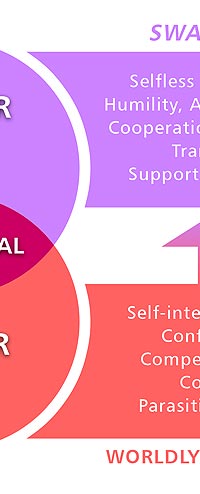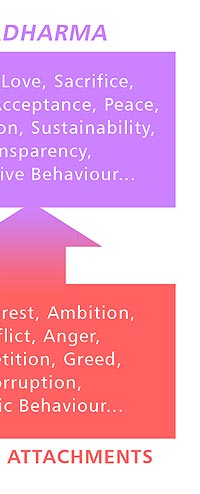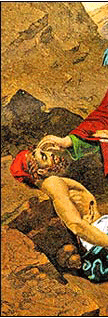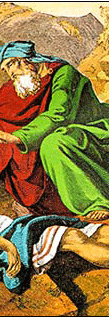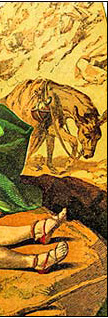spiritual questions and answers PART 8 (Continued from the previous issue) By Prof. G. Venkataraman |
||
Since Heart2Heart started in 2003, readers have very often written to us seeking answers to many spiritual questions. We have answered them at times through appropriate articles in H2H. However, there are still many that have to be explained carefully and in detail. And in the recent past, a lot more queries have arrived on varied topics concerning spirituality and personal growth.
We have now meticulously compiled and categorised these questions, and Prof. G. Venkataraman has offered to answer all these queries in a structured and systematic way as a series on Radio Sai as well as in H2H. In this way, these answers now remain always on our website as a ready reckoner on spiritual doubts.This is a suitably adapted transcript of our radio series bearing the same name. To listen or download the talk from our website, please visit www.radiosai.org/qa
Loving Sai Ram and greetings from Prasanthi Nilayam. We are now into our eighth Q & A session and as usual, I would like to begin by expressing the hope that you are getting something out of this series.
This month’s question bag has only two questions instead of the usual three. I presume that is because the producers thought these two questions alone would require all the time allotted for this program. Let us see. The questions that I have to deal with in this session are as follows:
QUESTION 1: What is Mama Dharma?
QUESTION 2: How can we realise the God within us?
|
The word Mama Dharma is not all that common and the fact it features in a question to me means that the one who submitted this question has obviously heard Swami use that phrase. Actually the question is a very important one and I think I should first explain why that is so, before proceeding to answer it.
Swami often asks His students what is the last word of the last sloka in the Bhagavat Gita. For students, that question is easy because many of them have read the Gita; that word is Mama. Swami next asks what is the first word of the first sloka of the Gita. This is even easier for students of the Gita, for that word is Dhamakshetre.
Swami now says: “Combine the last word with the first part of the first word; what do you get?” The word that we get by this process is nothing but Mama Dharma. Swami then slowly says, “That word Mama Dharma, is the essence of the Gita.” So, what the questioner wants to know is: “What really is the essence of the Gita, and why is it so important?”
I trust with that brief background, you will be able to appreciate why this particular question is most important. Before I get on to the actual answering, I should point out that Swami sometimes uses another phrase in place of Mama Dharma, and that is Atma Dharma. Does Krishna say anything at all about this in the Gita? Sure He does; but the phrase He uses is Swadharma. So the first thing we have to learn is the equation:
Mama Dharma = Atma dharma = Swadharma
That is to say, all these three words are completely equivalent and interchangeable. The last remark is very important; why? We must first understand that before we get on to the question proper.
Now in the context in which we are using it, the word Dharma essentially means duty. The phrase Swadharma used by Krishna in the Gita is often translated in English as ‘duty of the self’. Technically this may be correct but trouble comes when one mis-interprets the word “self”.
The Two ‘Selfs’
Vedanta talks in terms of two SELF’s associated with our personality. The first is the Real Self, also sometimes called the Higher Self, while the second is the False Self or Ego, also called the Lower Self. I do hope all that terminology does not confuse you. Even if it does not, you might still say, “OK, all this is fine but where is the problem?” The problem arises when one asks: “What is this “Self” that Krishna is talking about, and how is that connected with the two types of Self that you just mentioned?”
The problem arises in the following manner. Now unfortunately, most people take Swadharma to mean ‘the duty of the Lower Self’ and thereafter interpret the word ‘duty’ in the sense we usually do. This might appear to make eminent sense but it is not correct; in fact to do so is quite misleading, and as far as I know, Swami alone has most emphatically drawn attention to the true meaning of Swadharma.
|
|||
| True duty to the 'Self' means acting for the sake of one's higher Self instead of one's lower self |
Once you accept Swami’s way of interpreting Swadharma, the entire ballgame changes and the Gita acquires a vastly profound meaning and depth; that is why this question is so very important. What follows would largely be an expansion and amplification of this comment.
Let me get back to the word I started with, namely, Mama Dharma. Suppose one were asked to translate that into English, one would automatically say, Mama Dharma means ‘my duty’. Seen in this light, when scholars usually say that Swadharma means ‘duty of the self’, it would appear that they are indeed correct. Yes, they would be so, provided they associate the word SELF with the Higher Self rather than the Lower Self, as is usually the case.
Which ‘Self’ am I?
I am sure you are thoroughly confused, and so, by way of explaining it all, let me take you back to a question that Swami often asks in His Discourses, and that question is: “Who am I?” As we shall see, the answer to this question is intimately tied to the question we are considering and trying to answer.
Ask anyone, “Who are you?” and the person would invariably reply, “I am so and so,” and proceed to give his name. If the person is businessman or a techie, he would immediately flash his visiting card, which would not only tell you the name of the person, but also his job title, the organisation he is working for, his phone number, his email ID and so forth. So, all’s perfectly okay.
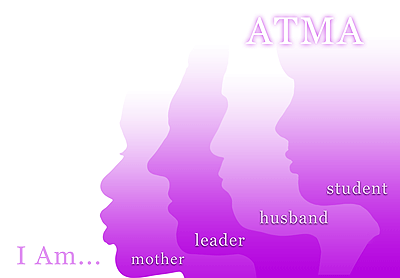 |
|
Who are you REALLY? |
In that case, where exactly is the problem? Given the way I am building this up would, it may seem to suggest there is! Well, yes there is a problem because the response we are seeking is not in relation to day-to-day matters but in relation to Spirituality. Where worldly matters are concerned, it is indeed correct and proper to identify oneself by the name given by one’s parents, via one’s profession, and so forth. However, when it comes to answering Swami’s basic question “Who am I?”, responses of the type I am mentioning fall flat! Why?
The answer to that was given a long time ago by Krishna; in fact that is almost the very first thing He teaches Arjuna when He says, “Arjuna, you are not the body! You think you are the body, but in reality you are the Eternal Atma; that is your True Nature and not the transient body you are wearing right now. You may go through many lives wearing many bodies; does that mean that your nature is changing every time you are born?
Not at all! Humans change their dress every day; the dress may change but the person wearing the dress remains the same, is it not? In the same way, many bodies might be worn but that which wears the bodies remains the same. Now who is that which is wearing the different bodies? That is the one who says ‘I’ while responding ‘I am so and so’. That response actually means, ‘I am in fact the Eternal Atma, presently donning a body that answers to the name of so and so, that is shown on my business card!’”
Of course no one gives a long and technically correct answer like that, and that is because hardly anyone is aware that he or she is the Atma! This lack of awareness is very dangerous, because it severely affects the way one performs one’s duty. One might be under the impression that one is very meticulous and is performing one’s duty the way one is supposed to and all that, but if the person does not know such things like what is meant by the word Atma, why Swami says we are the Atma, what is the difference between the so-called Higher Self and the Lower Self, etc., then one is in danger of doing things that actually go against one’s real duty.
In other words, if one is really serious about performing one’s duty as Krishna ordered us to, and as Swami is reminding us we should, then we had better take a few minutes to understand what this Mama Dharma/Atma Dharma/Swadharma is all about! I hope with that “sales talk” I have persuaded you to pay close attention to what follows.
Atma Dharma and its Vital Importance in Our Lives
Before I proceed further, for the benefit of those who are rather frightened by the word Atma, think of it as the Soul within us. Seen this way, Mama Dharma simply becomes: My duty in accordance with the dictates of the Soul. Hope that makes it easier to follow! For the moment, instead of using the phrase Mama Dharma, let me stick to the more common one, namely Atma Dharma and proceed further and see what exactly Atma Dharma implies.
 |
I would like to add that I am making this special choice because this way, the critical word Atma would always remain on the radar screen. Keeping in view what I just said, Atma Dharma simply means performing actions that are in full accord with the Nature of the Atma. Now you might feel frustrated and think that I am merely juggling with confusing statements! Not really; give me a few minutes and I shall explain it all.
The first thing we have to understand is that when Krishna told Arjuna that he was the Atma, He was in fact saying, “Arjuna, do you realise you are actually God wearing a human dress?” One wonders whether Arjuna did, but it is to remind us of that very same fact that often when we hail Swami as God, He tells us, “You also are God!”
At other times, He addresses us as Divyatma Swarooplara, meaning “Embodiments of the Divine Atma”. And have we not heard Him begin most of His Discourses these days with the word Prema Swarooplara, meaning “Embodiments of Divine Love”? Why does He do all this? He does this in order to remind us that we all are Sparks of the Divine.
Now this is a very important point. Many people imagine humans are born sinners. Vedanta says “No, on the contrary, your intrinsic nature is Divine; maybe you have accumulated a lot of dirt just as children become dirty when they go out and play in the mud. But that does not mean your basic nature is that of a sinner.” Keeping all this in mind, Atma Dharma simply means,
“God we all are in truth, and God-like all our actions must be!”
That makes sense, does it not? So the question now becomes: “How to make sure that our actions are God-like?” Many might laugh and say, “Listen, stop being stupid! Do you mean to say when I wave my hand in a circular fashion, rings, watches and chains would drop out?” No, dear reader, being God-like does not mean that at all.
In the Gita, Krishna says at one point that where virtues like Sathya or Truth, Dharma or Righteousness, Prema or Pure Unselfish Love, Daya or Compassion, Kshama or Forbearance, Ahimsa or Non-violence shine, there one finds the radiance of Divinity. Thus, being God-like means our actions should have the stamp of Divinity, the fragrance of Divinity and the radiance of Divinity.
Hearing this, people would shake their heads and mutter, “Nonsense,” or “Impossible,” and so on. But let me give you a very simple example to prove that the radiance of Divinity is not so rare as we might imagine it to be.
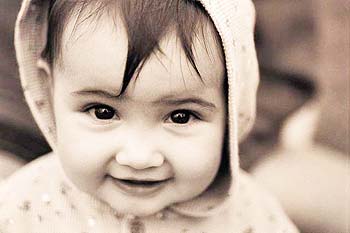 |
|
A baby's natural state is one of bliss |
Have you ever seen a tiny baby, just a few days old, smile? I am sure many of you have. How wonderful that smile always is! Have you ever wondered why on earth that baby smiles? Has it won a lottery? Has it got admission to Harvard?
Have the stocks it owns suddenly shot up in value on account of a very bullish market? None of these things; on the contrary, the baby hardly even knows who its mother is. It is just a couple of days old; and yet, such babies do smile. What exactly are they so happy about?
As Swami sometimes reminds us, little babies are close to God, and God being always in a state of Bliss, babies too are happy – that is their natural state. It is only when they begin learning about the world, start getting attracted to sweets, attached to toys and so on that trouble begins! Anyway, my point was something different, which is that the radiance that one sees along with the beautiful smile that little children flash is actually the radiance of Divinity.
So after all this, what is the point am I making? Basically, I have thus far tried to convince you that deep within, we are in fact Divine. If that is the case, is it not obvious that our actions too must reflect the Divine within?
Atma Dharma simply says that since we are intrinsically Divine, there is an obligation on everyone to make sure that his or her actions always reflect the nature of the Atma. Many might say, “that is a tall order”; before I deal with that issue, there is another question I should answer. People might say: “To ask people to follow the Atma Dharma, is pretty vague. What exactly are we supposed to do?”
Now this is an important, practical point and needs some discussion. Basically, Atma Dharma is a general principle, which, by the way, applies to everyone and at all times; no one is exempt, be it the king or the pauper. That said, the practical application does differ from person to person. Clearly, the way a teacher applies it would differ from the way a government official does and so on. But this much is common, no matter who it is, the person must make sure that whatever is done is in full conformity with Sathya and Dharma – that really is the bottom line. Also, there must be no trace of selfishness whatsoever; moreover, the action must, without fail, reflect Divine Love!
Atma Dharma Comes Before Worldly Duties
I shall not discuss here the question whether following Atma Dharma is practical or not in the modern world, but I shall illustrate what it means with a simple example. Let us say a person is walking along a road and is in a hurry to reach his office because an important task is awaiting him. As he is speeding towards his office, he sees a pedestrian being knocked down by a speeding car that runs away without stopping to help.
|
||||
The Christian tale of the Good Samaritan is an allegory for human beings acting on their Atma Dharma |
The person knocked down is injured and needs help badly; however, no one is coming forward to help. What should our man in the example do? From a worldly point of view, he might have an excuse for not stopping.
However, his Atma Dharma requires him to come forward to help. Would that not risk this man losing his job? What would happen to his family then? Those considerations simply do not enter where Atma Dharma is concerned. Remember, one must act the same way God would!
One might persist and say, “Be practical man! It is all nice to talk about acting like God and all that, but what would happen if, after all, this man is fired from his job for not showing up when he was required to?” I agree that is an argumentative point, but if while rushing to help, one also has full faith in God, then that same God would definitely do smoothing to protect the person’s future; one must have that faith.
Faith is an important component in Spirituality. Many do not have it but those who do, would be well aware of the old saying that he who protects Dharma would be rescued by that very same Dharma; no surprise in that because Dharma is God. Thus, when one says that Dharma would take care, it really means that God would take care.
So, if we are serious about following Swami, who strongly endorses Atma Dharma [after all, it was He who taught it first, to Arjuna, that is], then we should have the faith that He would not only be very pleased but also give us full support. Let us not forget His assurance that if we take one step, he would take a hundred towards us; we must have full faith in that. Then, following Atma Dharma would never be a risky proposition, as many believe it might be.
I shall now move on to the next question, which is:
QUESTION 2:
How can we realise the God within us?
ANSWER:
I have already discussed this question in an earlier session; at that time, the question was posed as: “How can we realise our innate Divinity?” In view of that, I shall not go over all that ground again; however, since the question has been formally posed in this talk, maybe I could just say a few words by way of response.
 |
|
The ABCs of purity |
Basically, though God is our Indweller, we fail to realise that because of spiritual ignorance. This automatically implies that if we are to recognise the Divinity latent within us, we must scrub away all the crust of ignorance that masks the Divinity. That scrubbing is achieved largely through Sadhana or appropriate spiritual practices.
People often have a rather mistaken notion about what Sadhana is, and imagine that it means performing all sorts of rituals and so forth. Swami makes it very clear that Sadhana simply means removing the spiritual contamination that all of us so easily acquire; in short we must improve our mental purity, if we are keen on realising that God is actually resident within us.
Swami has talked umpteen times about how to improve mental purity, and I shall refer you to Sai literature for that. Here, let me say that one very useful tip is: See no evil, hear no evil and do no evil, all of which adds up to one simple instruction, which is: Avoid Bad Company!
I would also like to draw your attention to the following quote from Swami, which also is about Sadhana:
Man has to undertake various types of Sadhana to purge his Heart of impurities. Exercises such as meditation, chanting, etc., can only provide mental satisfaction. It is only when the Heart is melted in the heat of Divine Love that one can succeed in getting rid of bad qualities and make the Heart shine in its pristine effulgence. Just as the Sun’s rays can burn a heap of cotton if the rays are concentrated through a lens, the rays of the intellect would destroy one’s bad qualities only when they are passed through the lens of Divine Love.
Well, that is all for now and I do hope, as always, that you found it useful. Goodbye for now and God bless. Jai Sai Ram.
(To be Continued...)
Dear Reader, how do you like this series? Does it help you in any way? Do you have any spiritual questions which need clarification? Please feel free to write to us at h2h@radiosai.org mentioning your name and country. Thank you for your time.







